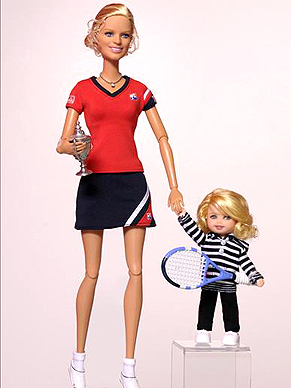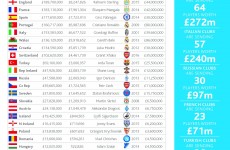- 1
5 February 2010
Kim Clijsters has this week had the peculiar honour of becoming the first athlete in the world to be immortalised in shapely plastic as a ‘one-off Barbie’. The Belgian tennis star and her daughter, Jada, who turns two this month, each received Barbie versions of themselves, which have been unveiled to the public alongside dolls of JK Rowling and Princess Victoria of Sweden.
Rosa Zeegers, senior vice-president of Barbie International, said; “Kim Clijsters is a reflection of modern women across the world as she is successfully combining a successful career while enjoying life with her family.” Even more impressively, if Clijster’s Barbie self is anything to go by, she does this on legs so thin they would snap with one knock from a tennis ball.
Perhaps receiving her own Crystal Tennis Kim will have helped Clijsters recover from the shock of flunking out of the Australian Open in the third round less than two weeks ago. Expectations were high after Clijsters returned to tennis last summer – having retired from the game two years previously to start a family – and promptly won the US Open in September, becoming the first mother in 29 years to win a Grand Slam singles title.
Clijsters joined just eight other mums on the main WTA tour and a handful of sportswomen who have, in aspirational Barbie fashion, combined career and family. They are rare enough and have received enough publicity that even a sport dunce like me can name a few: Paula Radcliffe, Liz McColgan and Lindsay Davenport have all made headlines by returning to competition within months of giving birth.
The Independent’s website, always a good place to find a list, greeted Clijsters’ success in the US Open with a handy guide to ‘Ten sporting comebacks from motherhood’ just as though motherhood were a place of no return. Clearly, newspapers are not a place to go in search of subtlety but I have to wonder why it is that these women’s continued pursuit of their chosen career is greeted with amazement.
There was no such astonishment at Roger Federer’s continued dominance of men’s tennis after his twins arrived, so why is it assumed that women are more radically affected by becoming a parent?
Physically, there is no reason that mothers should not continue to compete. It has been suggested before that going through pregnancy might even make women stronger and fitter, though this was refuted by Dr Patrick O’Brien, spokesman for the Royal College of Obstetricians and Gynaecologists, who told The Guardian that research has shown that any supposed beneficial effects of pregnancy on the cardiovascular system wear off within weeks of the birth.
However Dr David James of Gloucester University’s faculty of sport suggests that women may benefit from motherhood in another way: “It is probably the case that most athletes do slightly too much training, not too little. When other priorities come along and they have necessarily to reduce their training a little bit, that might not altogether be a bad thing.”
Psychologically, too, motherhood would appear to have a positive effect. Paula Radcliffe has spoken of how her happiness at having a child fed into her running and of how family life helped to put training and competing into perspective.
Sybille Bammer is the only mum other than Clijsters in the WTA’s top 100. Bammer has been much more successful since becoming a parent (her highest ranking pre-babe was 200; in 2007 when her daughter was six she reached no 17) and says that being a mother made her more focussed and determined. She says: “I think I was mentally so much stronger when I came back. I really knew this was my last chance.”
So, if physically and psychologically mothers are as capable of competing as they were before they had children, that leaves the issue of opportunity. Clijsters’ defeat in Melbourne was described by some commentators as ‘the end of her comeback dream’.
Clijsters’ own website is more sanguine – a report on the match bears the splendidly understated headline: ‘Clijsters experiences off day’.
Most mums experience those several times a week. Frequently, off days start with someone small clambering into your bed at four in the morning because their cuddly toys look scary in the dark. Off days also feature at least one trip to a supermarket in the reluctant company of young children. Someone is inevitably late for something, like school. There’s a hefty dose of housework to swallow. And there’s a bit of shouting, or more than a bit.
These off days do not normally include a Grand Slam tennis match, and I am willing to bet my Tesco Club Card vouchers that Clijsters’ “off day” in question did not involve many of the ingredients above.
In terms of managing daily family life, Clijsters is likely to have more in common with Roger Federer than with any ordinary mother. Like Federer, Clijsters earns enough to take her family with her to work, traveling with husband, daughter, coach, and other staff and, of course, a nanny as and when she wants that extra help. And, because she controls the purse strings she thus controls her time and faces none of the pressure experienced by normal working mothers. If Clijsters has a bad night with a sick or just sleepless child and doesn’t feel like training the next day, the only person who will give her a hard time is herself. She has no employer or colleagues to convince that she needs a day at home.
But of course, Clijsters is not ordinary. To have earned such success, she has had to be a determined and focussed competitor. Why should she be different now, just because she has had a child? To take my own example, I was disorganised and easily distracted before I had children and, sadly, motherhood has not altered me.
I think it is a magnificent achievement for anyone to reach the top of any sport. To suggest that it is harder for Clijsters because she is a mother does her no service. As she says herself in her Twitter profile: ‘Mother, daughter, sister, wife, tennis player – I have many aliases’.
Now, thanks to Barbie International, she has another to add to the list, and why should we assume that one of these ‘aliases’ might rule out another?











1 comment
great article helen and a group of us were talking about just this a couple of weeks back. i had dinner with my friend marianna, a former player, and a few of her friends who were arguing about just this. kim still has to get back to her original level of fitness which has nothing to do with pregnancy; just lack of practise. she’ll definitely win another slam. i’m going to show this piece to m. great stuff! Patrick